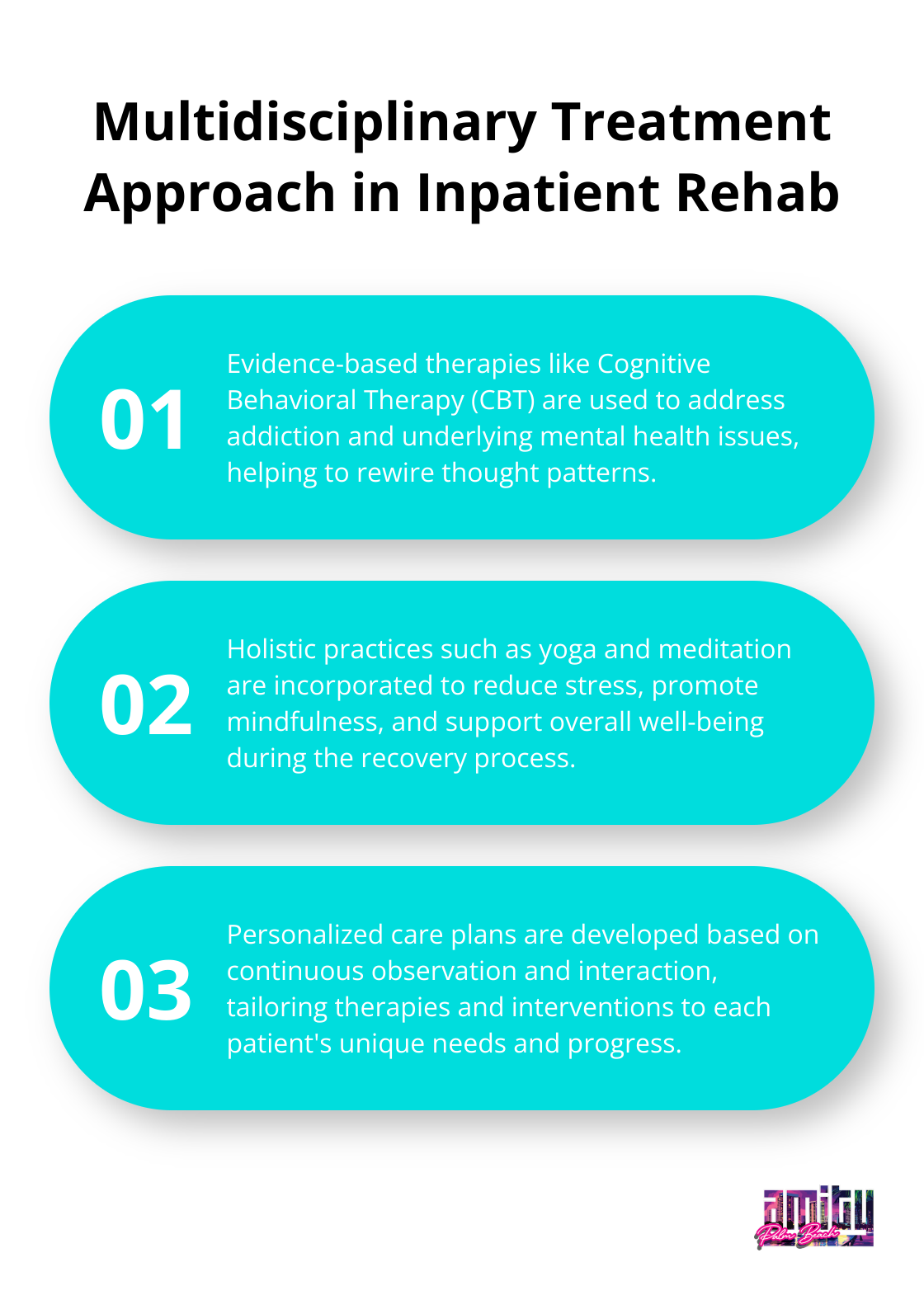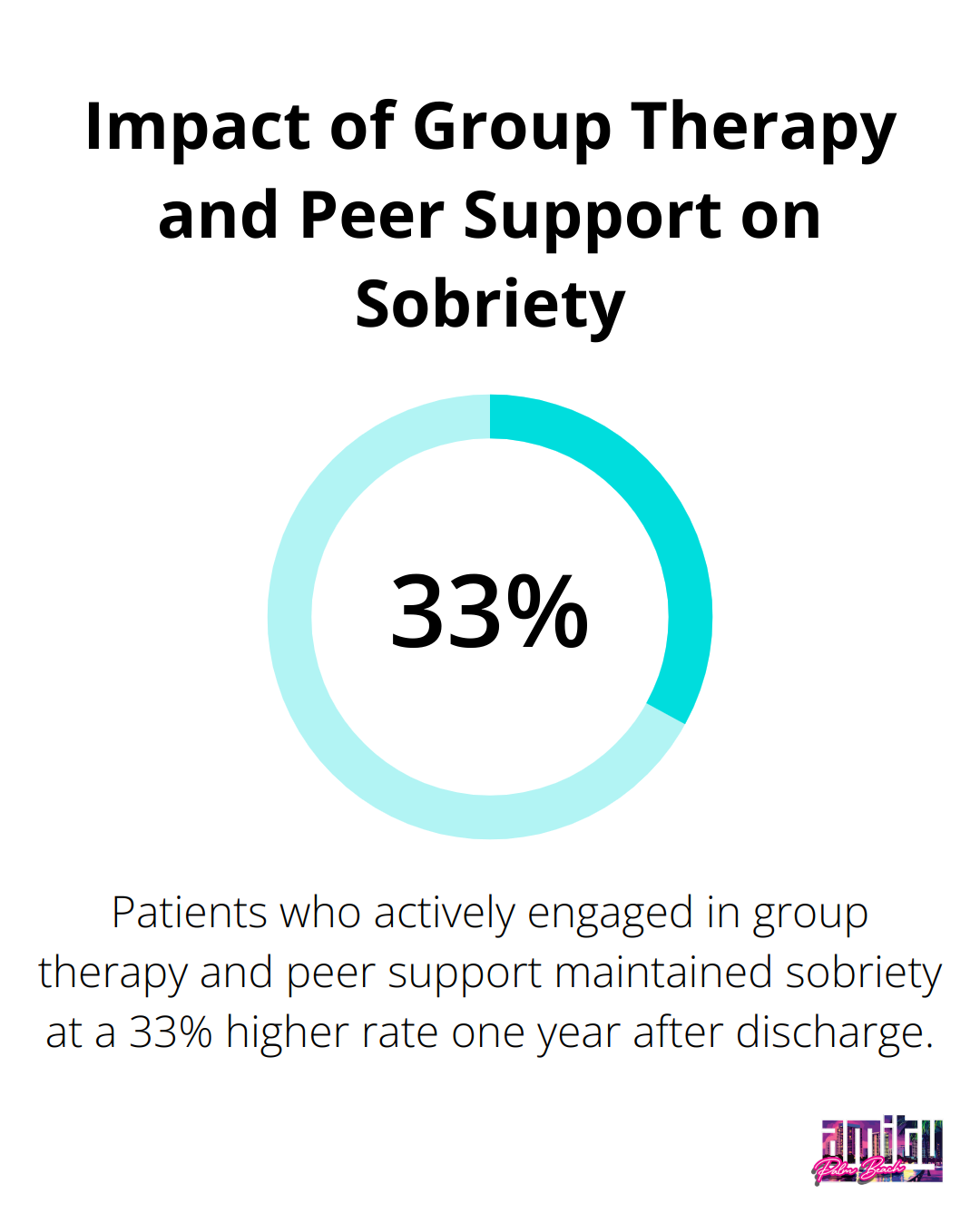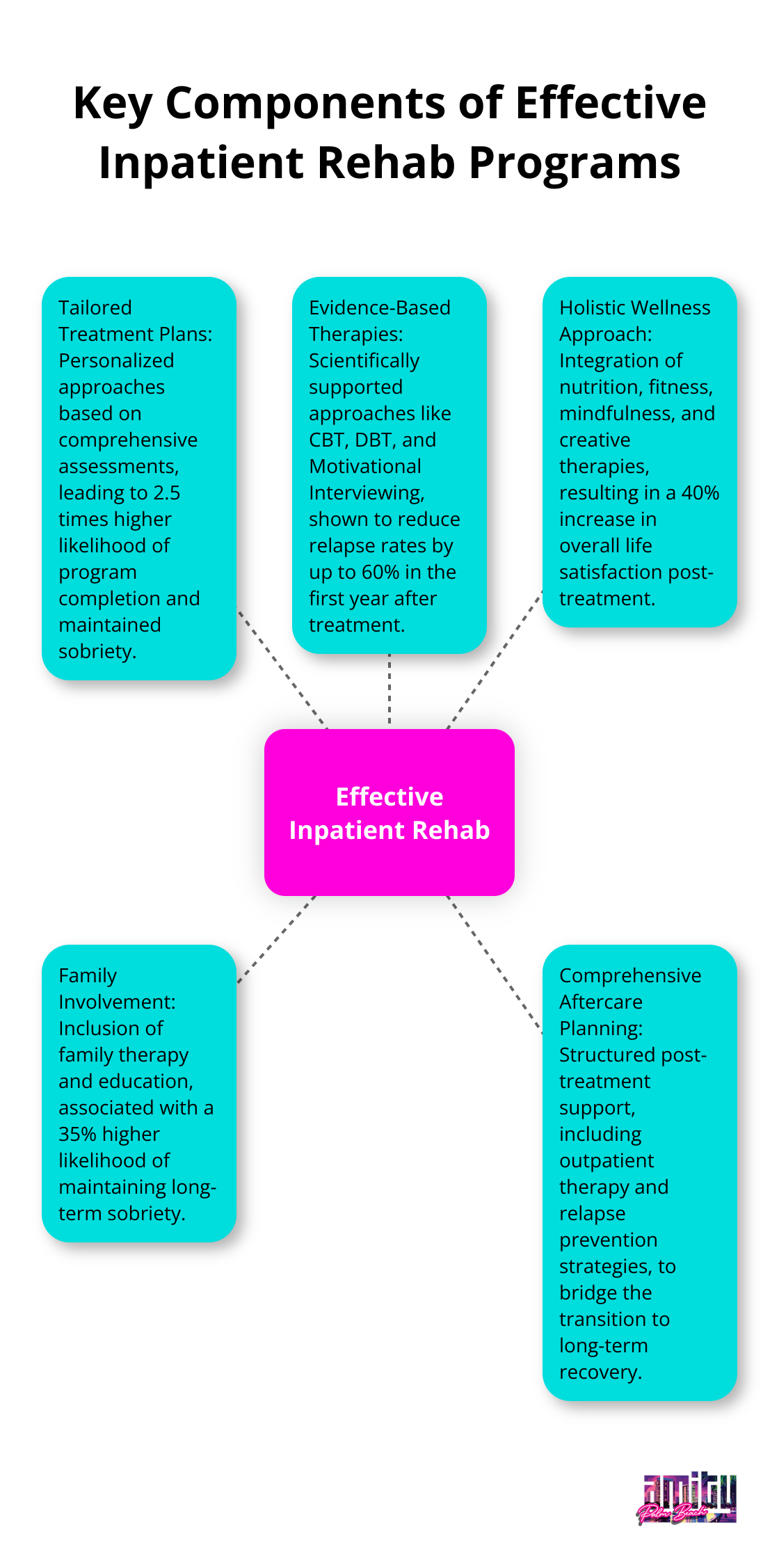At Amity Palm Beach, we understand the challenges of overcoming addiction and the importance of comprehensive healing.
Inpatient rehab offers a unique opportunity for individuals to find stability and embark on a transformative journey towards recovery. This intensive approach provides a structured environment, round-the-clock support, and a multifaceted treatment strategy.
In this post, we’ll explore why <a href=”https://share.google/V3Fb6lqR1VEcZD9gZ”>inpatient rehab</a> is often the most effective path to lasting sobriety and overall well-being.
What Makes Inpatient Rehab So Effective?
At Amity Palm Beach, we witness the transformative power of inpatient rehab daily. The comprehensive care and immersive environment create a robust foundation for lasting recovery. Let’s explore the key elements that contribute to its effectiveness.
24/7 Medical Support
Inpatient care offers a structured, supportive environment that enhances the recovery process. Medical professionals remain available at all times to manage withdrawal symptoms, administer medications, and address any health concerns. This constant supervision proves essential, particularly during the early stages of recovery when relapse risk peaks.
Controlled Healing Environment
Inpatient rehab removes individuals from daily life stressors and triggers, allowing full focus on recovery. This structured environment eliminates substance access and provides a consistent routine that promotes healing.
A study found that residential treatment increased the likelihood of completion to a greater degree for older clients, Whites, and opioid abusers, compared to outpatient treatment. The controlled environment of inpatient rehab plays a vital role in this success.
Multidisciplinary Treatment Approach
Inpatient rehab offers a comprehensive approach to treatment. Patients work with a team of professionals including doctors, therapists, nutritionists, and wellness experts. This holistic strategy addresses not just the addiction, but also underlying mental health issues, physical health, and overall well-being.
At Amity Palm Beach, we incorporate evidence-based therapies (like Cognitive Behavioral Therapy) alongside holistic practices such as yoga and meditation. This combination helps rewire thought patterns while also reducing stress and promoting mindfulness.

Personalized Care Plans
Inpatient rehab allows for highly individualized treatment. With continuous observation and interaction, the treatment team can tailor therapies and interventions to each patient’s unique needs and progress. This personalization (often difficult in outpatient settings) enhances treatment effectiveness and patient engagement.
Peer Support and Community
The group dynamic in inpatient rehab fosters a sense of community and shared experience. Patients support each other through challenges, celebrate successes, and learn from one another’s experiences. This peer support network often continues beyond the treatment period, providing ongoing encouragement in recovery.
The intensive, comprehensive care provided in inpatient rehab builds a strong foundation for long-term recovery. By addressing all aspects of health and well-being in a controlled environment, it offers the best chance for lasting change. Now, let’s examine how this controlled environment specifically benefits those in recovery.
Why a Controlled Environment Matters in Recovery
At Amity Palm Beach, we observe the profound impact a controlled environment has on early recovery. The structured setting of inpatient rehab creates a protective space, allowing individuals to concentrate fully on healing without outside distractions and temptations.
Freedom from Triggers
Inpatient rehab removes patients from everyday triggers. A study suggests that the use of strategies may be more important than willpower in recovery from addiction. This underscores the value of a trigger-free environment in the critical early stages of recovery.
The Strength of Peer Support
Inpatient rehab cultivates a unique community of individuals working towards a common goal. This peer support network proves incredibly powerful. Research published in the Journal of Psychoactive Drugs found that patients who actively engaged in group therapy and peer support activities during inpatient treatment maintained sobriety at a 33% higher rate one year after discharge.

Dedicated Self-Discovery
The controlled environment of inpatient rehab offers ample opportunity for self-reflection and personal growth. Without work, family obligations, or social pressures, patients can explore the root causes of their addiction deeply. This focused time for self-discovery often results in therapeutic breakthroughs and a stronger foundation for long-term recovery.
Structured Daily Routine
Inpatient rehab programs implement a structured daily routine that promotes healing and personal growth. This schedule typically includes:
- Individual therapy sessions
- Group counseling
- Educational workshops
- Holistic activities (e.g., yoga, meditation)
- Nutritious meals and regular sleep patterns
This balanced approach encourages accountability, builds self-discipline, and reinforces personal responsibility, all of which are vital for long-term recovery.
Professional Guidance and Monitoring
In an inpatient setting, patients receive constant professional guidance and monitoring. This level of care proves particularly beneficial for individuals with severe addictions or co-occurring mental health disorders. The presence of trained staff (available 24/7) provides immediate support during challenging moments and helps prevent potential setbacks.
The controlled environment of inpatient rehab lays a solid foundation for recovery. As we move forward, let’s examine the key components that make effective inpatient rehab programs truly transformative.
What Makes Effective Inpatient Rehab Programs?
At Amity Palm Beach, we’ve observed how the right components in an inpatient rehab program transform a person’s recovery journey. Let’s explore the key elements that distinguish successful programs.

Tailored Treatment Plans
Effective inpatient rehab programs recognize individual uniqueness. They start with a comprehensive assessment to understand each person’s specific needs, challenges, and goals. This information forms the basis of a personalized treatment plan.
A study published in the Journal of Substance Abuse Treatment found that patients who received individualized treatment plans were 2.5 times more likely to complete their program and maintain sobriety post-discharge compared to those who received standardized care.
Evidence-Based Therapies
The most effective inpatient rehab programs utilize therapies supported by scientific research. Cognitive Behavioral Therapy (CBT), Dialectical Behavior Therapy (DBT), and Motivational Interviewing exemplify evidence-based approaches that have shown significant success in treating addiction.
A meta-analysis published in the Journal of Clinical Psychology revealed that CBT, when used in inpatient settings, reduced relapse rates by up to 60% in the first year after treatment.
Holistic Approach to Wellness
Top-tier inpatient rehab programs focus on overall wellness, not just addressing the addiction itself. This approach might include nutrition counseling, fitness programs, mindfulness practices, and creative therapies.
A study from the National Institute on Drug Abuse found that patients who participated in holistic activities alongside traditional therapies reported a 40% increase in overall life satisfaction post-treatment.
Family Involvement
Successful inpatient rehab programs recognize the importance of family in the recovery process. They offer family therapy sessions, educational workshops for loved ones, and opportunities for family visits.
Research from the Substance Abuse and Mental Health Services Administration (SAMHSA) shows that patients with strong family support are 35% more likely to maintain long-term sobriety.
Comprehensive Aftercare Planning
The transition from inpatient care back to daily life presents challenges. Effective programs emphasize aftercare planning. This might include outpatient therapy, support group recommendations, sober living arrangements, and relapse prevention strategies.
Comprehensive aftercare planning serves as a vital bridge between initial treatment and long-term sobriety, emphasizing the importance of continuous care to prevent relapse and maintain recovery progress.
Final Thoughts
Inpatient rehab provides a comprehensive approach to addiction recovery. It addresses the complex nature of substance use disorders through intensive, structured environments that promote healing and long-term success. The combination of round-the-clock medical supervision, personalized treatment plans, and evidence-based therapies creates a strong foundation for lasting change.
Effective inpatient programs take a holistic approach, incorporating wellness activities and family involvement. They equip individuals with tools and support necessary to maintain recovery after leaving the treatment facility. The journey to recovery differs for each person, and professional help marks a vital step towards reclaiming life from addiction.
At Amity Palm Beach, we offer personalized, evidence-based care in a supportive environment. Our team of experienced professionals guides patients through every step of their recovery journey (from initial assessment to aftercare planning). If you or a loved one struggle with substance use, reach out for support today and take the first step towards a healthier, more fulfilling life.




